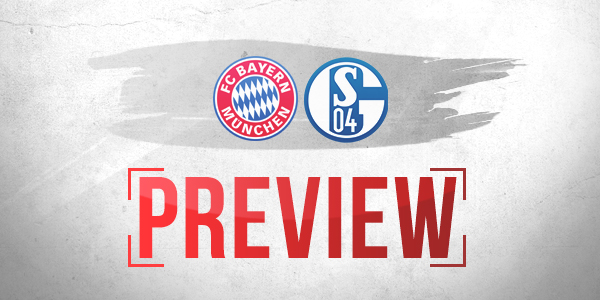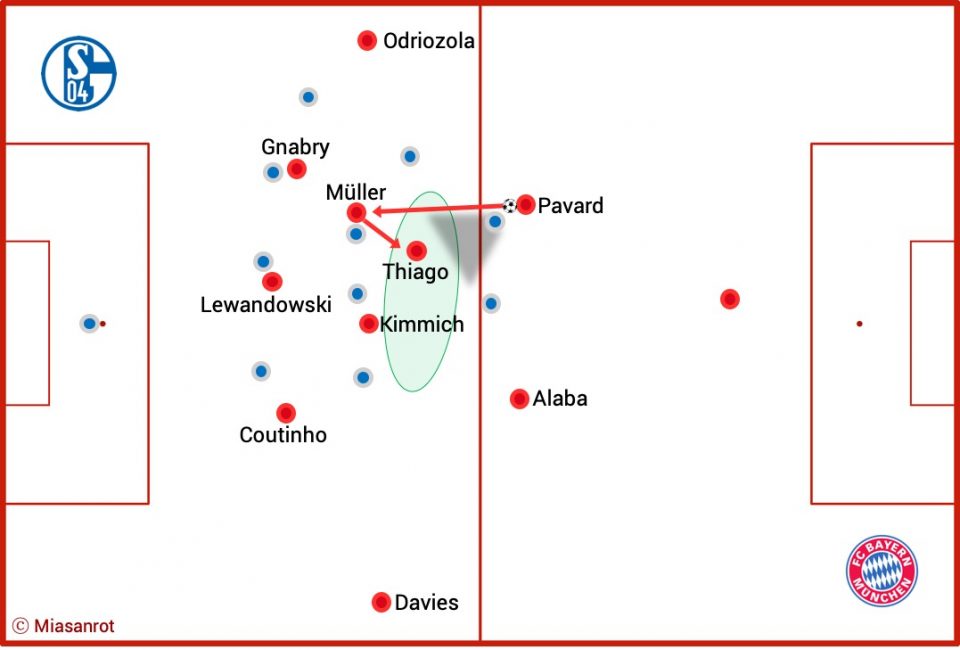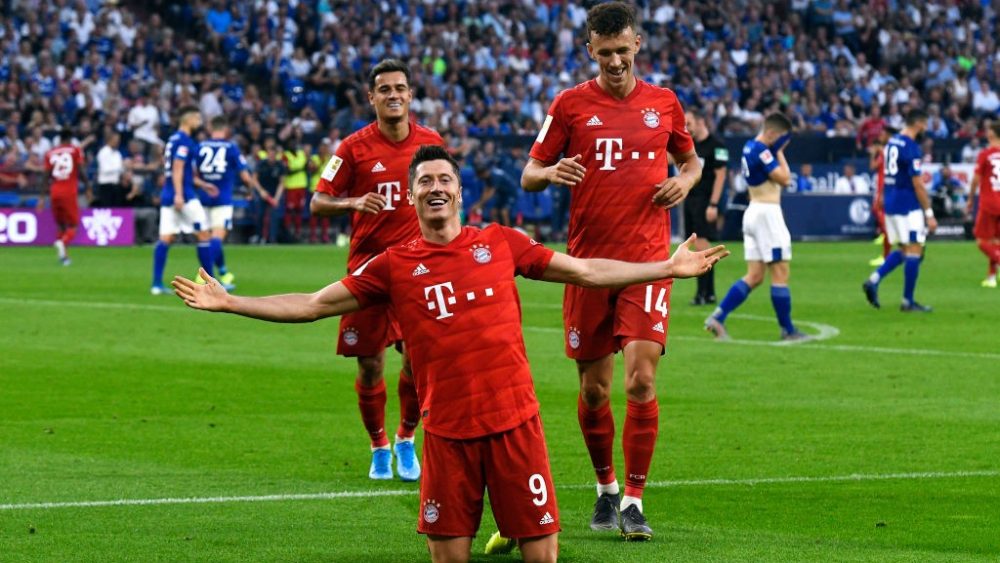Bundesliga MD 19 Preview – Bayern against Schalke
“Which of you has ever won against Bayern München?”, David Wagner asked his players in training earlier this week. At the pre-match press conference, he did not let the journalists guess for long: “There were not many.”
Omar Mascarell beat Bayern in the 2018 DFB-Pokal final with Eintracht Frankfurt and Daniel Caligiuri even has two wins against Bayern to his name: In 2015 he was in the starting eleven of the Wolfsburg team that beat Bayern 4-1 at home in the Bundesliga. Later that year, he also won the Supercup with Wolfsburg against Bayern on penalties.
Then there is Suat Serdar, who even won 2-4 at Bayern in 2014. However, this was with the U19 of Mainz 05. There are two obvious reasons why there are not too many players at Schalke who have won against Bayern over the course of their careers. Number 1: The average Schalke player is 24.6 years old (3rd place in the league). So most players have not had much opportunity to win against Bayern so far. And if there are players who have played against Bayern before, they have not been very successful (reason number 2).
Schalke themselves have been without a win against Bayern since 2011. Back then they won 1-0 in the semi-finals of the DFB-Pokal at the Allianz Arena, and since then Bayern has won 16 games and drawn three. To improve on this record, Wagner has a clear demand: “Our kind of football” is what he wants to see from his team.

FC Schalke 04: The first real test for Bayern in 2020?
But what does their kind of football look like? Anyone with an interest in Schalke’s new coach David Wagner before the season will have read many articles in which one information in particular kept being reiterated: Wagner was the best man of Jürgen Klopp at his wedding.
The connection between Wagner and Liverpool’s head coach is indeed an interesting one, especially from a tactical perspective. Because if you look at Schalke’s development over the past half year, the “Royal Blues” have acquired a new playmaker: gegenpressing.
Schalke have already scored five goals from gegenpressing breaks (2nd place behind RB Leipzig with 6). They have the seventh highest share of possession in the Bundesliga (50.4%), but they also have the ninth most interceptions (11.3) and the seventh most tackles per game (17.3) at the same time. In comparison: Gladbach as a team with similar possession stats and very aggressive pressing have 12.7 interceptions and 16.8 tackles per game.
Aggression, speed and risk
These statistics foster the impression that Wagner attaches great importance to pressing. Schalke usually plays in a very flexible 4-4-2 formation. Against a back three, for example, the ball-side wide midfield player pushes up in attack, while the other three players close the gap. Wagner has already tried almost every variation of a 4-4-2 and 4-3-3 formation there is.
On average, Schalke allow their opponents only 9.02 passes until they actively challenge them. This is a top value in the Bundesliga, bettered only by Bayern (7.15), Leverkusen (7.37), and Wolfsburg (8.71). Gladbach (9.36), RB Leipzig (10.07) and Dortmund (10.42) are somewhat less efficient here.
Schalke’s game is very vertical. After winning the ball, their goal is not to keep it in possession as long as possible, but to pick up speed immediately. Their pass completion rate of 77.1% only ranks 9th in the league. In addition, they only play an average of 9.28 passes until they turn over the ball (rank 14).1
Wagner demands an accurate and courageous positional play from his players to offer them a good starting position for gegenpressing in case of a turnover. If they cannot recover the ball within a few seconds, they often drop off a little without losing their aggressiveness.
In longer phases in possession, Wagner often varies his team’s formation in details. A constant element, however, is the combination of high full-backs backed up by the holding midfielders shifting out wide if needed. Schalke then builds up from the back in a back three.
More self-confidence and more courage against Bayern?
Thanks to the change in style, the team played a very successful first half of the season. At the same time, however, it must be mentioned that Schalke’s expected goals figures2 indicate an overperformance. On the one hand, this means that they scored significantly more often than could have been expected given their created chances: 23.7 expected goals (rank 11) are way below their 31 actual goals. On the other hand, they also conceded fewer goals against their opponents than could have been expected based on their opponents’ chances: 26.2 expected goals against (8th place) compares favourably to the 21 actual goals they have conceded.
Schalke can therefore justly be regarded as a team with the strength and potential of an upper second tier team in the Bundesliga. At the same time, however, they operate with a speed and intensity that could cause problems for Bayern. They also have an efficiency in front of goal that, paradoxically, is not due to the strikers. Suat Serdar (7), Amine Harit (6), Benito Raman (4) and Ozan Kabak (3) are the team’s top scorers. Ahmed Kutucu is the first real centre-forward on this list – he has 2 goals.
It should be exciting to watch with how much boldness Schalke will perform at the Allianz Arena. In the reverse fixture last August, the team showed a certain respect. Although Schalke sometimes acted aggressively and also in a higher midfield pressing, they hardly managed to gain the ball high up the pitch, which is so important for building their own game. The way to Manuel Neuers goal was mostly too long. Only when they were already 2-0 down, they began to play with more urgency and had a phase where they arguably could have turned the game around.
FC Bayern: Midfield is the key to success
In the meantime, however, Schalke should have gained more self-confidence. And even Back in August, they kept Bayern at only 1.6 expected goals. Based on this defensive stability and with a little more courage, Wagner will hope to get something from the match at the Allianz Arena.
Bayern in turn awaits their first real test. Hertha was not able to trouble Germany’s record champions at all last weekend. Schalke, however, is a far more ambitious team going forward.
Bayern’s defensive qualities against counter attacks especially will be put to the test for the first time in the new year. Were Hansi Flick and the team able to remedy the problems Bayern had in this area last year over the winter break? New arrival Álvaro Odriozola may be a help. The quick right-back, should he make his debut on Saturday, could allow Benjamin Pavard to start in central defense to make up for Jérôme Boateng’s lack of pace.
Better link-up in positional play
Beyond that, however, for Bayern the quality of their possession game will be crucial. Schalke keeps the center of midfield tightly covered. Bayern showed two different faces in Berlin against a team that also defends very compactly. But their two number eights in particular did hardly have any impact on the game.
Leon Goretzka and Philippe Coutinho rarely managed to link up with their teammates on the wings or at the back. Added to that, Coutinho sometimes even blocked areas used by Thiago or Goretzka, impeding their game. Here the balance was not right for a long time. Only as Bayern’s positional play improved a little in the second half (Coutinho moved about more and opened up spaces for Müller and Goretzka), Bayern managed to more and more string together a few constructive passages of play. These were mainly characterized by diagonal passes between the lines or give-and-go combinations. This can be a good strategy against Schalke:

Schalke will probably focus more on the Bayern’s center to disrupt their build-up play, particularly Thiago and/or Kimmich. A clever move by Flick would therefore be to have the two number eights and the full-backs link up even more consistently with the holding midfielder in order to induce Schalke to press, while at the same time offering passing options to avoid getting into the inefficient horseshoe shape around the opponent’s penalty area. Returning players Joshua Kimmich and Serge Gnabry could play an important role in this.
Who will ever have won against FC Bayern?
To sum up, from Bayern’s perspective the game this weekend can be considered as one that calls for the next step in their development. In their possession game, the progress they achieved in the second half in Berlin must be continued. Schalke is a team that will happily defend insipid crosses from predictable wing attacks all day.
The game against the ball is then a logical result of the positional play in possession. If Bayern are in a good position, they will be able to (re)gain the ball quickly. It is important to avoid situations like in the first half of the season, when the full-backs sometimes ran upfield for nought leaving large undefended spaces behind their backs, which the opponent was able to use to their advantage in their approach play.
Schalke wants to do just that: To win the ball from Bayern and evade their gegenpressing by moving the ball up fast. If they succeed, Wagner’s poll among his players as to who had ever won against Bayern in their careers could possibly yield a considerably greater share of “yes” votes as early as Sunday. On Saturday, Bayern will have to become a lot more consistent compared to last week if they want only Caligiuri and Mascarell to be able to raise their hands again.
1 Data from understat.com
2 Data from fbref.com












Bayern 4 schelka 1